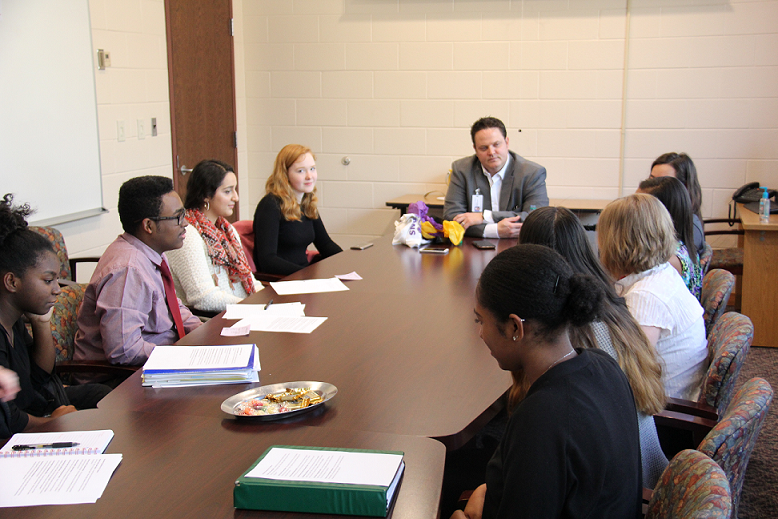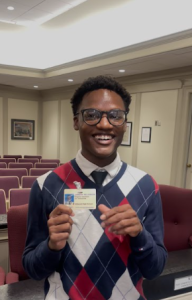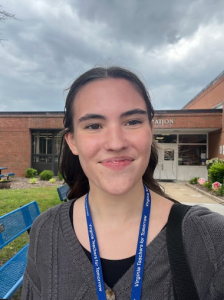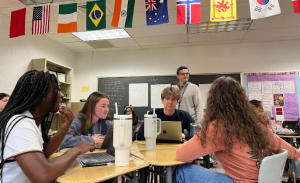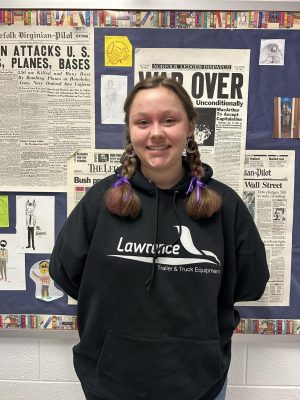Suspensions, Grading, Start Times, Movies: A Conversation with Superintendent, Dr. Aaron Spence
February 29, 2016
On February 9, 2016, writers and editors for The Roaring Gazette met with the superintendent of Virginia Beach City Public Schools, Dr. Aaron Spence. The conversation, printed here in its entirety, touched upon discipline, grading, schedules, and more.
Roaring Gazette: From Aniyah Lewis, News Editor: I would like to know about the Student Discipline Task Force. What’s the group’s goal and what might change in the future in terms of discipline?
Dr. Spence: The goal of the student discipline task force was basically to look at the division’s suspension rates, so it started around suspension. When I got here, I looked at a lot of our data, and I tried to identify some areas that I thought would be of concern. I thought we had a lot of suspensions. I know we have disproportionality in our suspensions. Particularly, we suspend African American students. If you look at the pure numbers, about 1 in 3 African American boys will be suspended in Virginia beach, and about 1 in 12 of the rest of the student body will be suspended over the course of their time with us, so that’s not good. I think we can all agree that’s a problem.
I asked the task force to come together and look at the reasons for that, to determine what are our structures that are in place for our students that we might be able to reevaluate, to determine what is our own personal behavior as educators that we may need to reevaluate.
And then the primary mission is to keep people in class. When you look at what happens in our school division – and it also happens nationally, but I want to make it clear that that doesn’t make it an excuse for Virginia Beach – there are achievement gaps, by which I mean we have differences in how certain groups perform versus other groups. For Virginia Beach, that’s students with special needs and students of color. If you are African American, you are less likely to graduate, less likely to be successful in your classes, more likely to be suspended, and less likely to come to school every day.
When you look at the sum total of those challenges, we need to do something different, so here’s what their recommendations have been so far:
They recommended training for the division, system wide awareness training as a starting point. Sometimes the saying is you have to recognize there’s a problem before you deal with the problem. System wide awareness training is to have a conversation like I just had with you: This is the problem and we have to do something about it.
The next piece of the training is cultural competency training, based on research. It’s the thinking of the task force that a lot of the challenges are because our teachers and our students come from different places, different cultures, and different environments. Sometimes you don’t understand each other, and so, for example, after cell phones and attendance, the number one reason for being suspended is for defiance and disrespectful behavior. We had a panel of African American students. We asked, “Why is that happening?” What they said was, “I’m not being disrespectful. I’m expressing myself in a certain way that my teachers don’t understand.” So I think there’s an opportunity there to talk about how to relate better, and we don’t help each other understand what each of us means, and that’s what cultural competency training is all about.
Another training that they recommended is called MANT training. MANT training is a nationwide training that is all about working with people in crisis. A lot of times when you get to the place where suspension becomes necessary, someone is in crisis. It’s either a personal, right-then crisis or it’s something that’s triggering their behavior before they even get to school: “I watched my dad hit my mom last night.” “I haven’t eaten in 2 days.” Whatever that crisis might be. And it’s helping people recognize those crisis points and then deescalating.
Do you remember the story about the girl in South Carolina with the cell phone? It was an interesting story about discipline. She had a cell phone in class, and the teacher wanted the cell phone. She didn’t want to give up the cell phone. There were probably lots of things she could have done better, but there was probably something going on with her about not wanting to give up that cell phone. Like a personal thing, like if that was her only personal possession. I don’t know. The teacher had a moment to choose: “Do I escalate this situation or deescalate the situation?” The teacher chose to fight. The teacher chose to get that cell phone no matter what. As a result, the principle was called in, and then eventually the resource officer was called in, and that child was arrested and taken to the floor in a very violent way.
My thinking would be that didn’t need to happen. That could have been deescalated. You know, it could have been like, “Keep the cell phone, I’ll talk to you later. We’re going to keep learning, and after I get everybody learning, I’m going to talk to you and just be in the hallway. I’m not going to take your phone. I’m just going to ask you what’s going on.” That’s what MANT training teaches us to do, so that’s one of the recommendations.
There are three other recommendations besides training. One includes the need for a child psychologist, because what we’re seeing in our student population is a growing challenge with mental illness, which is sad for me that young people are dealing with mental illness. We’re seeing that grow in droves, and we don’t have enough child psychologists to deal with that. Often, we find that challenges with mental illness lead to significant and severe disciplinary issues.
The other recommendation is the creation of an office of achievement and opportunity, with the idea being, if you’re going to be successful in an organization, you have to have people that wake up every day and think about things. So, why do our food services programs work? Because I have people who wake up every day and think about making food for students, right? So I don’t have to do that. I have someone who does that. Why does out English/Language Arts curriculum get written? Because I have English/language arts specialists who get up every day and think about writing the English/language arts curriculum. Not my cup of tea, but they love it. So what I need is somebody who gets up every day and helps me think about: how do I connect all of our resources to helping young people achieve at a high level and succeed, especially underserved young people? That’s another key recommendation of the task force.
RG: From Destiny Smith, Features Editor: Can you tell us about the work of the Fair and Equitable Grading Practices Committee and what changes are you considering making to the grading policy and why?
DS: I’m not considering making any changes to the grading policy, but the committee is thinking about what recommendations they might make about grading practices. And it’s specifically called “grading practices” because our policy is fairly lukewarm on grading. It doesn’t say much about grading. It doesn’t talk about “should we use zeros, should we not use zeros, should students be allowed to turn in retake tests” and all these sort of different things that are out there in conversations about grading.
Our board had a conversation with me last summer, and they said, “We’re hearing a lot of inconsistencies. We’re hearing some schools are using what are called ‘fair and equitable grading practices,’ which are grading practices designed to really measure what you know versus behavior.” And they said, “But other schools aren’t doing that, and should they be doing it? And who gets to choose? We’d like some recommendations on that.”
We put together this committee to look at the things that are causing a lot of anxiety right now, whether or not we would encourage teachers not to use zeros and also the idea that, if you fail a test or a project, you have the opportunity to keep going until you learn what it is you’re supposed to learn–you don’t just fail, that there’s a next step in that process.
So a lot of times, what happens in grading is if you failed, you get a 50. Or a zero if you didnt turn it in, and it goes into the grade book. You either don’t have the opportunity to demonstrate that you’ve learned that material and we’re moving on, or you learn it some other way, and you don’t really get to go back and get credit for learning it.
So the question–and I’m not answering the question; I’m posing the question–is is that right? What are we trying to achieve with grades? So what we’re really asking with this grading committee is, “What is the purpose of a grade?” And I think that’s what they’re wrestling with right now.
RG: From Marissa Goodall, Opinion Editor: I would just like to ask if you are considering any schedule changes in the future such as the 4 by 4 schedule or new start time. Explain why.
DS: We do have a group that is coming together, they haven’t started yet, but another task force. There are really three basic task forces that I launched this year; you’ve sorted out which three they are.
Really, its school start times, because if we change anything with high school, it’s going to impact everybody. We were approached by the medical community over the last year, and they said, “Listen, we have a growing body of evidence that says teenagers should not start school as early as you’re starting them.”
Believe it or not, your brains don’t actually turn on until about 10 o’clock in the morning. Some of you have probably sensed that for a while, right? That’s not a value thing, that’s just developmental. There is a lot going on developmentally for you, and so your brain is at rest until it’s ready to go for the day. The medical establishment is basically saying, “Look, if you want to really support learning, you need to wait until they’re a little bit more awake.”
And they have some other statistics. There was a big study that was done on driving and car accidents. And what they found out is there are a lot more car accidents in the morning when you start schools early, typically high school students who shouldn’t be awake. These are pretty significant concerns, and we want to look at that.
The flip side, as all of you know because I’m sure you’re talking about this, is there are a lot of reasons that high school students want to be out early. They like to work or need to work. Many of our high school students, including my own daughter, watch their younger brothers and sisters when they get home from elementary school. There are athletics and afterschool activities. You guys are writing the papers afterschool, I’m sure, sitting in the journalism room. If you get out at 4:30 instead of 2:30, that means you’re there later.
So there are legitimate reasons on the flip side of the conversation to not move high schools. I think, as a leader, you can unilaterally make decisions or you can try to involve people in the conversation. So all of this task force work is to try and get people involved in the conversation. No decisions yet; we’ll just leave it at that.
RG: From Dana DeHaan, Arts and Entertainment Editor and Film Critic: What’s your favorite movie?
DS: You know, I saw that one, because you guys sent me these in advance. I don’t know if you know that, and I was looking at the movie questions and was like, “Geez, I don’t even know my favorite movie.” But, okay, I’m going to give you one.
So I’m a romantic comedy guy. I know, you’re surprised, right? I really like romantic comedies. Some of my favorites are Love Actually, Knotting Hill–I’m a sucker for the Hugh Grant movies. It’s really embarrassing to tell you that.
But my favorite one–I don’t know if you heard of this one–is Music and Lyrics. You’ve heard of Music and Lyrics? Okay, so you got to check out Music and Lyrics. You need to review Music and Lyrics. It is so great. It’s Hugh Grant and Drew Barrymore, and he’s this washed up 80s singer, and it’s such a great movie. It’s hysterical because Hugh Grant actually sings these 80s, cheesy pop songs in the movie, because he’s a washed up 80s singer, and he sings these really horrible, off songs. But they’re so catchy. I have them on my itunes now.
RG: From Ethan Wentzell, Staff Writer: Here at the Global Studies and World Languages Academy, each student takes at least two languages. As a former French teacher, why do you think it’s important for students to learn other languages?
DS: Well there’s an academic reason to study other languages. The academic reason is about neural development.
Studying other languages–and we were talking about this earlier–it actually improves your achievement in other areas. It makes you a better English learner; it makes you have better grammar; it makes you a better writer, simply because you understand the form and function of language. It just really cements, academically, the use of language. So, there’s a positive benefit to it there.
Way beyond that, though, is the importance of understanding other cultures. You learn that there is a world way bigger than the one you live in. You guys are in an interesting kind of crossroads, because you’re in a place now where you have access to that world unlike any other generation of people before you. It’s not really hard for you to visit the Louvre. You don’t have to actually get on a plane to go do it. You can take a virtual tour of it; you can street map it with Google. You could literally walk up the Champs-Élysées without being there just by going to Google Maps.
But there’s something about really diving into another person’s culture and trying to understand them. I’ll give you a great example as a French teacher. How many of you have ever heard somebody say something like the French are really snobby? Like, the French don’t like Americans. Have you ever heard that? Okay, it’s completely untrue, but until you’ve studied their culture and understand their language, it’s going to be hard for you to understand that. Because what the French aren’t is friendly like Americans are.
If you ever meet Americans, what’s the first thing they do? They smile, say “hi,” and if you wait five minutes they’ll tell you their life story, right? We’re just a very open friendly culture. In France, you’re not considered to even be an acquaintance until you’ve been invited over for dinner.
So I might know you through a friend, and if I know you through a friend in America you’re an acquaintance. I may even friend you on Snapchat or Instagram, right? But I’m not going to do that in French culture. That may be changing now, because the world’s getting flatter, and social media is opening doors for people in a different way. But primarily, historically, French cultures been very, kind of, closed. But once I know you, we’re great friends, very friendly. And, if I particularly try to make an attempt to speak your language–and don’t speak louder in my language, thinking that will make you understand–I’m far more likely to be friendly towards you.
When I lived in Paris, I had a great time. I never found anybody to be snobby; I never found anybody not to like me just because I was American. I had a wonderful time. But I understood that piece of French culture; I didn’t try to tell my life story the first time I met a French person.
Those opportunities exist for us now all around the world. And now, more than ever, the world is a dangerous place. If we don’t get to know each other better and recognize there are more similarities among us than differences, we’re going to end our species. We need to be very careful about that.
RG: From Amea Waller, Photography Editor: We know that in some Virginia Beach Schools, there is technology provided students for educational purposes. My question is: What do you see in the future (long term vision) for technology in schools?
DS: Long term vision, everybody gets to use technology every day. But it’s not technology for technology’s sake. I want you not to have a computer just to have a computer, I want you to have a computer for a purpose. One of the things we are doing now is we’ve launched our Anchor Schools Initiative. The point of the initiative is to find that purpose. Basically, what is it that we hope you can do with computers that you can’t do today in the learning environment?
There’s no question that when you leave here–go to work, go to college–you’re going to using computers. You’ll be using them every day. You’re going to be solving problems, creating things, collaborating, sharing them, and publishing items for people to see and to work on and learn from. So what’s our role in education? It’s to teach you how to do that.
It’s, frankly, criminal that you come to school and we tell you, “Put those things away and turn them off.” We have to teach you to use them in a way that is expected of you when you leave here. And that’s really what my vision is, to do that.
RG: From Donavon Lea, Social Media Coordinator for the Roaring Gazette: What is your goal for the social media awareness campaign, and how do you plan to get there?
DS: This is a good tie-in to the last question, because my goal is that you are able to, as the campaign says, be social, but, at the same time, be smart and be safe. This is a critical challenge.
Everybody in the room uses social media? Okay, one way or the other, right? Everybody in the room has an experience with someone who used it inappropriately? I’d be amazed if you hadn’t experienced that. I have experienced that. Somebody will send me something, and I’m like, “Really? That was a good idea? I’m your superintendent!”
Here is what worries me: I want you to be social. Every single work place I know of uses social media in productive ways. They use it for collaboration. They use it to share ideas. They use it to market their products. They use it to tell their story. You’re sort of out of step with the times if your organization is not a social media driven organization. So you need to do that, just like you need to be able to use other technologies in other ways to be productive and creative, but you need to know how to do that appropriately.
We all need to know how to do that appropriately, and unfortunately–and don’t take this the wrong way–teenagers don’t always make great decisions. I don’t mean that in a judgmental way; that’s part of growing up. You make mistakes; you learn from those mistakes.
The problem with social media is those mistakes are now on permanent record. And so the whole point of the campaign is to understand they’re on permanent record, that what you put out there never disappears. Even if you delete it, it’s still there, and we can find it. We want you to understand that part of being smart means that permanent record is going to be something that other people want to see.
I know you’re now hearing things you’ve heard before, but the reality is when you go to college, or when you apply to college, first thing they do before they send you the acceptance letter is Google you and begin digging into your cyber-portfolio. If they don’t like what they see–if they see inappropriate behavior by you, if they see inappropriate pictures by you, if they see inappropriate postings and rantings and ravings by you, or even, frankly, if they feel like your politics are outside the bounds of what they’re willing to accept at their university–they’re going to pull that acceptance letter.
I’m worried that young people don’t understand the implications of that. It’s the same with employers; employers do that. We do that. In Virginia Beach, before we hire you, we Google you, and we check out your social media background to find out if you’re a good role model for young people. Most employers today are doing that.
Many of them–and many of the universities and colleges–are hiring cyber detectives, putting them on their staff, people who can dig deep beyond Google and really find you. (They can) find the deleted pictures.
I want young people to know that being smart means thinking about your digital portfolio and footprint for the long term. What might be funny in the moment–when you’re at a party and someone does something stupid, and you take that picture and put it online–is not funny in terms of its long term implications.
The last piece of that is the “Be Safe” piece, and of course that’s just the fact that, beyond smart and beyond the implications for college and employment, it’s a dangerous place.
I really feel for you guys. In a way, I’m very envious because you’re growing up with these amazing technologies that I didn’t have. I didn’t get my first cell phone until I started teaching. Think about that. I didn’t have my first computer until I graduated from college. In college I had a type writer, and I’m not that old. You’ve grown up with this wonderful stuff and these amazing things you can do and these amazing opportunities, but, at the same time, you’re subject to predation. There are predators out there who are looking for you, and that makes me nervous. It makes me nervous for you, and it makes me nervous for my own children. And there are ways to be safe.
The whole point of all of this is to make sure you’re aware of that, and not just you but your parents. How many of your parents know how many social media accounts you have? Not everybody, right? Well, I would argue that they should. And I know that you might argue with me that they shouldn’t, but I would argue that they should because right now, you want your parents as a second voice for you, telling you this is good or this is not a good idea. You don’t think you do, but I promise you, you do because they know what your future is.
So part of our goal is to educate our parents. We’ve put this online so our parents can see, because–you know, I’m going to be honest with you–you remember the threats that were happening before the break? There were a couple of apps on there I had no idea about, and I’m superintendent of schools. I didn’t know that “Afterschool” was an app that people could get on.
When one of my daughters first got on Instagram, I didn’t know she was on Instagram, and she posted something she shouldn’t put on Instagram that I felt was going be a negative impression in her digital world. I didn’t see it until I finally figured out she was on Instagram. So I said, “I need your account and I’m going to look.” Then, we had a good conversation about why I think it’s a bad idea.
We need parents to be there alongside you guys and with us to help educate ourselves. At the end of the day, we all want what’s best for you. That’s the reality. That’s a very adult, parent-like thing to say, but, guess what, I’m an adult and a parent. So I said it, and we just want what’s best for you. That’s why we’re doing this.

